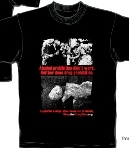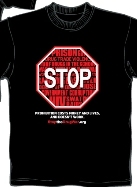San Diego may be a gleaming, coastal California city, but when it comes to medical marijuana, it's more like Fresno-by-the-Sea. The latest round of dispensary raids has patients and advocates fuming and looking for ways to extract political revenge and gain a little justice.
The number of marijuana arrests last year declined for the first time since 2002, the FBI said in its Uniform Crime Report this week. The overall number of drug arrests also fell slightly. The down-tick seems to be the result not of enlightened policing, but of law enforcement agencies feeling the budgetary pinch.
The Higher Education Act's "Aid Elimination Penalty," or anti-drug provision, is poised for further watering down after the House of Representatives passed a bill that would limit it to people with drug sales -- not drug possession -- convictions. But the provision's author, Rep. Mark Souder (R-IN) kept fighting almost until the end.
To kick off our autumn fundraising drive, StoptheDrugWar.org is pleased to offer the exciting new book, "Marijuana is Safer -- So Why Are We Driving People to Drink?," as our latest membership premium -- donate $36 or more and we'll send you a copy for free! Things are happening, and the importance of your support at this time could not be greater.
Mexican President Felipe Calderon's war against drug cartels reached a milestone late last week, but not the kind he's looking for: This year's prohibition-related death toll has gone over the 5,000 mark.
More fun for the Philly narcs, a New Jersey ICE employee goes down, and a Brooklyn drug squad supervisor gets off easy.
The State Department and President Obama have issued the annual, congressionally-mandated list of countries not complying with US drug war objectives. The only countries listed as not in compliance are three with which the US has chilly relations, while countries like Afghanistan and Pakistan, elements of whose governments are deeply implicated in the drug trade, get a pass.
And then there were two: Pennsylvania's Board of Pharmacy has issued new regulations allowing pharmacies to sell syringes without a prescription. That leaves Delaware and New Jersey as the only states that don't.
Minneapolis has become the largest US city without a drug squad after the chief axed it as part of an effort to reduce a $5 million budget gap.
Indonesia has a new drug law, but it looks pretty much like business as usual for Southeast Asia, home of some of the world's harshest drug laws.
Faced with thousands of drug tourists flooding into their towns each week, the mayors of two Dutch border towns ordered their cannabis coffee shops to quit selling marijuana as of Wednesday. Coffee shop owners went to court last week to block it, but so far with no luck.
Events and quotes of note from this week's drug policy events of years past.
Do you read Drug War Chronicle? If so, we need your feedback to evaluate our work and make the case for Drug War Chronicle to funders. We need donations too.
Every two years drug policy reformers from across the United States and around the world come to the International Drug Policy Reform Conference to listen, learn, network and strategize together for change. This year the conference is in Albuquerque, in November, and StoptheDrugWar.org is a partner.
"Former Mexican President Proposes Legalizing Drugs in Mexico AND the US," "The Marijuana Ads That ABC, FOX, and CBS Refused to Show You," "The Weekly Standard Cheers on Mexican Drug War Bloodshed," "No Matter How Bad You Think the Drug War Is, It's Worse," "Using Drug Laws to Steal From Innocent People," "US Forest Service Apologizes for Racist Marijuana Warning," "Drug War Violence is Destroying Mexico's Economy," "The Manhattan DA's Race: The Princess of Darkness vs. Two Former Coke-Snorting Assistant DAs," "A Victory in the House of Representatives," "ALERT: Crucial Vote on Souder's Law Happening Tomorrow -- YOUR PHONE CALLS NEEDED!," "Drugs the Most Numerous Arrest Type in '08, Though Down Slightly from '07, FBI Reports," "Room for Debate on Mexico's Drug Decriminalization Law."
Apply for an internship at DRCNet and you could spend a semester fighting the good fight!
San Diego County District Attorney Bonnie Dumanis claims to be a friend of medical marijuana, but one would be hard-pressed to find anyone in the local medical marijuana community who would agree with her. This "friend" coordinated mass raids against medical marijuana dispensaries there in 2006, again in February of this year, and yet again just last week.

courthouse demonstration (courtesy William West, myspace.com/williamwwest)
It is part and parcel of a pattern of bitter, recalcitrant refusal on the part of San Diego county officials to abide by the will of the voters and accept the state's medical marijuana law. The conservative county Board of Commissioners is notorious for its opposition to medical marijuana, going so far as pursuing a quixotic and costly legal challenge to state laws, which it lost in every court that heard it.
On Tuesday, the Board unanimously extended for 10 months a moratorium on new dispensaries in unincorporated areas of the county. After its court challenge to the state law was defeated, the Board is now grudgingly allowing staff to develop regulations for dispensaries, but in the meantime, DA Dumanis is picking them off in batches.
The city of San Diego has been a bit more friendly. Last week, just one day before Dumanis' raiders struck, the City Council voted to implement a task force to create recommendations for regulating collectives and co-ops in accordance with guidelines issued earlier this year by the state attorney general. But if the City Council is working with the medical marijuana community, the San Diego Police Department is not. Instead, it has joined forces with Dumanis and her conservative cronies to attack the dispensaries.
Last week's raids shuttered 14 dispensaries in San Diego, the North County, and South Bay, and resulted in 33 arrests -- 31 under state charges and two under federal charges -- including wheelchair-bound patients hauled away by armed and uniformed law enforcement agents. Dumanis assembled squads of San Diego Police, San Diego County Sheriff's officers, DEA agents, and IRS agents to swoop down on the dispensaries, make arrests, seize cash and medicine, and disrupt the local medical marijuana distribution system.
While the DEA was present, last week's raids were Dumanis's baby. Only two of those arrested face federal charges.
"It was a joint investigation with the sheriff's department and the police department," said San Diego DEA spokeswoman Amy Roderick. "We were asked for our assistance. We were not at every location."
Roderick declined to spell out how DEA San Diego is interpreting the current Justice Department position on not pursuing medical marijuana providers in states where it is legal unless they are in violation of state law. "I can't comment on policy," she said. "It's not made by the DEA."
"Like most San Diegans, I support the use of legitimate and legal medical marijuana use," Dumanis said at a press conference touting the busts. "However, it appears these so-called 'marijuana dispensaries' are nothing more than for-profit storefront drug dealing operations run by drug dealers hiding behind the state's medical marijuana law."
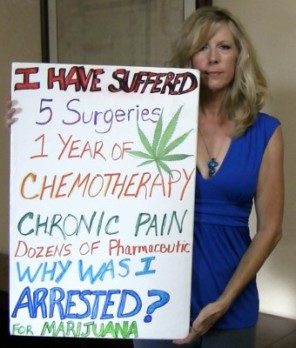
Donna Lambert (courtesy William West, myspace.com/williamwwest)
"We're not surprised at all, but very disappointed," said Margaret Dooley-Sammuli, deputy state director for the
Drug Policy Alliance. "What Dumanis is doing is simply unacceptable. If she has legitimate concerns about how dispensaries are operating, whether they're operating as collectives, she could use civil actions, she could use letters and accountants. There is no call for bringing in the DEA, arresting people in wheelchairs, scaring the hell out of patients, and shutting off medical marijuana access for very sick people. It's her tactics that we're really concerned with," she said.
"But also her misrepresentations to the public of what she's doing and her unproductive strategy of pointing out what she says is illegal, but not saying what is legal," Dooley-Sammuli continued. "Collective operators are doing their best to comply with the law, but she doesn't have answers for them. People have gone out of their way to follow the guidelines, but got raided anyway."
I don't think Bonnie Dumanis has ever seen a legal dispensary in 13 years," said Dion Markgraff, San Diego coordinator for Americans for Safe Access "She can't follow the plain language of the law, but instead she holds some impossible standard that no one else knows about," he said.
"We're on the front lines of the most terrorist county in the whole state," Markgraff continued. "The DA is sending in cops who lied to doctors to get valid recommendations, and then busting dispensaries that are operating according to the law. At worst, maybe somebody didn't file this or that piece of paper or had a zoning issue, but there was certainly nothing criminal."
Markgraff himself has had a taste of the DA's bitter medicine. "I was raided two months ago for 32 immature plants," he related. "My girlfriend and I both have medical marijuana recommendations, and I had a state caregiver card. The cops laughed at my card, then stole it. They took everything, they arrested me and my girlfriend, they took my kid, they gave us both $130,000 bail. Now we're fighting this Kafkaesque, Orwellian system where the prosecutors and the judges don't give a shit about legality."
There was nothing unique about police seizing his daughter, Markgraff said. "They do it all the time. The first thing they say is 'we're going to take your kids if you don't plead.' When they're using your kids as leverage, that's really ugly," he said.
"We have not, and will not prosecute people who are legitimately and legally using medical marijuana," Dumanis said at the press conference. "It's a shame that a few illegal drug dealers are trampling on the compassion shown by voters in passing California's medical marijuana law."
Medical marijuana patient and now criminal defendant Donna Lambert begs to differ. She joined a 10-person medical marijuana collective after the 2006 raids that disrupted supplies. "I provided medical marijuana to a valid qualified patient who was an undercover cop who lied to a doctor to get a doctor's recommendation," said Lambert, who was one of 14 people arrested in the Operation Green RX raids conducted in February. "There was no dispute about my patient status or his patient status."
In Operation Green RX, as many as ten detectives spent six months becoming qualified medical marijuana patients on fraudulent grounds and then joining medical marijuana collectives. Undercover San Diego Police Detective Scott Henderson lied to a doctor to obtain a valid medical marijuana recommendation and then reached out to Ms. Lambert for help. When, believing she was lawfully helping another patient, she supplied him with medical marijuana, Lambert became yet another of Dumanis' victims.
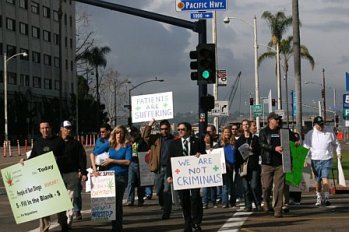
San Diego demonstration against 'Operation Green RX' (courtesy William West, myspace.com/williamwwest)
Lambert, a 47-year-old San Diego resident, began relying on marijuana to cope with chemotherapy. She struggles with a number of serious illnesses, including hepatitis C, cirrhosis, cancer and Sjoegrens Disease. She was bound over for December trial during a preliminary hearing last week, despite the judge in that hearing noting that she was clearly not in it for profit. "My attorney says they've never dismissed a medical marijuana sales case in San Diego," she said.
"They are a little more conservative down there than the other coastal cities," said San Francisco-based Marijuana Policy Project spokesman Bruce Mirken when asked what was the matter with San Diego. "It seems like the county is more a problem than the city, and some of their officials, including the DA, are particularly bad."
California's confused medical marijuana law is part of the problem, said Mirken. "It doesn't specify with absolute clarity what is legal and what isn't when it comes to medical marijuana distribution. Everyone is operating on the attorney general's guidelines, which haven't been tested in court, and that leaves room for interpretation, so you have fertile ground for officials who choose to be jerks to wreak a great deal of havoc. That's what's happening in San Diego County."
"People got up in arms at the DEA, but in this case, they were playing a supporting role," said Mirken. "The real problem is local officials who think medical marijuana is okay as long as you don't actually get it from anyone. The law says patients can have marijuana, so it makes sense to have an aboveground, organized distribution system. We have working models for that in places like San Francisco and Oakland. It's not that hard to do if you have the political will to do it," Mirken said.
"It's just been an ongoing battle for lo these many years," said Dale Gieringer, head of California NORML in San Francisco. "The city of San Diego isn't so bad, but the county is more conservative. The county board of commissioners is the one that filed the lawsuit trying to overturn the state medical marijuana law. And the DA is just bad. We initially approved of her election; she is gay, and was viewed as progressive, but she's been really tough on medical cannabis. Still, I see a glimmer of hope here. In half of her statements, Dumanis seems to be saying that there might be some legal dispensaries around, but nobody's clear on who they are."
San Diego medical marijuana patients and activists aren't seeing glimmers of hope; they're seeing red. "We need to replace the DA, most of the county board, and the county sheriff," said Lambert. "They are all working together to subvert the state law. It doesn't matter to them if people are following the law or not, she just lies through her teeth about it. I am the perfect example of her lies."
"Dumanis has made a political calculation that this will appeal to her conservative base," said Markgraff. "There is no one currently running against her, but we are trying to get someone to do that. There are plenty of people upset with her, and now just in the medical marijuana community. She's ripe for being thrown out," he said.
"We are mobilizing in San Diego," said Dooley-Sammuli. "Patients and medical marijuana supporters are working to put pressure on her to stop these tactics, and we're working with the newly created city task force to craft regulations, but this is really all about Bonnie Dumanis and the upcoming election. She is hoping this will work for her politically, and we're working to see that it doesn't."
San Diego activists told the Chronicle of many more horror stories about medical marijuana persecution under DA Dumanis. While they are working to get rid of Dumanis and bring a measure of real justice to the DA's office, the Chronicle will be digging a little deeper into the alleged abuses.
back to top
The number of people arrested for drug offenses in the United States declined slightly last year, according to the FBI's Uniform Crime Report. And for the first time since 2002, the number of people arrested on marijuana charges also declined. The number of arrests for all drug offenses declined from 1,841,182 in 2007 to 1,702,537 last year, while the number of people arrested on marijuana charges dropped from 872,721 in 2007 to 847,864 last year.
|
| Drug abuse violations |
|
United States total |
Northeast |
Midwest |
South |
West |
| Total1 |
|
100.0 |
100.0 |
100.0 |
100.0 |
100.0 |
Sale/
Manufacturing: |
Total |
17.7 |
22.1 |
19.3 |
16.4 |
16.1 |
|
Heroin or cocaine and their derivatives |
7.7 |
13.4 |
5.6 |
7.5 |
5.8 |
|
Marijuana |
5.5 |
5.9 |
8.2 |
4.3 |
5.4 |
|
Synthetic or manufactured drugs |
1.5 |
1.2 |
1.2 |
2.6 |
0.6 |
|
Other dangerous nonnarcotic drugs |
3.0 |
1.5 |
4.4 |
1.9 |
4.3 |
| Possession: |
Total |
82.3 |
77.9 |
80.7 |
83.6 |
83.9 |
|
Heroin or cocaine and their derivatives |
20.1 |
20.7 |
12.5 |
21.0 |
22.3 |
|
Marijuana |
44.3 |
46.5 |
51.9 |
50.2 |
33.2 |
|
Synthetic or manufactured drugs |
3.3 |
2.7 |
3.8 |
4.2 |
2.5 |
|
Other dangerous nonnarcotic drugs |
14.6 |
8.0 |
12.5 |
8.2 |
25.9 |
|
| |
table from http://www.fbi.gov/ucr/cius2008/arrests/
|
More people were arrested for drug offenses last year than live in the cities of Phoenix (pop. 1.55 million) or Philadelphia (pop. 1.45 million). More people were arrested for marijuana offenses than live in the cities of Jacksonville (pop. 805,000) or San Francisco (pop. 764,000). Based on the overall drug arrest figures, somebody got busted for dope every 18 seconds in 2008, and somebody got busted for pot every 37 seconds.
Last year, marijuana arrests accounted for nearly half -- 49.8% -- of all drug arrests, up slightly from the 47% in 2007. The vast majority of marijuana arrests -- 89% -- were for possession only, meaning that more than three-quarters of a million Americans got busted last year not for drug trafficking or manufacture, but as nothing more than pot consumers. In two regions of the country, the South and the Midwest, simple marijuana possession arrests accounted for more than half of all drug arrests.
Similarly, when all drug arrests are tabulated, possession arrests constituted 83.3% of the total. That means out of the 1.7 million total drug arrests, only about 300,000 were for "drug dealing" or manufacture, and 93,640 of those were for marijuana, which includes people growing even one plant or for medical reasons.
While last year's pot bust numbers represent a 3% decline from 2007, the 2008 numbers are still the second highest annual toll on record. Marijuana arrests stood at about 300,000 in 1991 before climbing sharply during the Clinton administration to more than 700,000 by 2000. During the Bush administration, annual pot arrests continued to climb, but more slowly, going over 800,000 in 2006 and reaching the all-time high of more than 872,000 in 2007.
While the trend over the past two decades has been upwards, this isn't the first year that marijuana arrests have declined over the previous year. Similar blips have happened five times since 1990.
The number of drug arrests in 2008 was about three times the number of people arrested for all violent crimes (595,000) and greater than the number of people arrested for all property crimes (1.68 million).
Defenders of the status quo eager to downplay the consequences of drug prohibition are wont to argue that many arrests aren't really arrests -- some people are ticketed or cited and released -- or that hardly anybody goes to jail, especially for marijuana. There is a small degree of truth in each argument, but being arrested on a drug charge, even a marijuana possession charge, carries serious consequences for the arrestee.
People arrested face legal fees, fines, and, quite possibly, time behind bars, even for marijuana offenses. Upon conviction, they also face a raft of collateral consequences ranging from loss of access to student loans, public housing, and other federal benefits to loss of (or inability to obtain) professional licenses, problems with employment, and loss of children to state child welfare agencies.
The 2008 arrest figures come just days after the National Survey on Drug Use and Health reported that the number of adult marijuana smokers increased from 22 million in 2007 to 22.5 million last year. The number of Americans over age 12 who admitted ever smoking marijuana was also at an all-time, both in raw numbers and as a percentage of the population. Last year, 41%, or more than 102 million Americans said they had tried marijuana.
Drug reformers were quick to use the arrest figures to call for change. "In our current economic climate, we simply cannot afford to keep arresting more than three people every minute in the failed 'war on drugs,'" said Jack Cole, a retired undercover narcotics detective who now heads Law Enforcement Against Prohibition.
Cole also warned of the collateral consequences of a drug arrest. "You can get over an addiction, but you will never get over a conviction," he said.
The pot people, revved up by a seeming seismic shift in popular attitudes now underway, were also quick on the attack. "Federal statistics released just last week indicate that larger percentages of Americans are using cannabis at the same time that police are arresting a near-record number of Americans for pot-related offenses," said Allen St. Pierre, head of the National Organization for the Reform of Marijuana Laws (NORML). "Present enforcement policies are costing American taxpayers tens of billions of dollars, ruining the lives of hundreds of thousands of Americans, and having no impact on marijuana availability or marijuana use in this country. It is time to end this failed policy and replace prohibition with a policy of marijuana regulation, taxation, and education."
"This slight dip in the number of marijuana arrests provides a small amount of relief to the tens of millions of American marijuana consumers who have been under attack by their own government for decades," said Marijuana Policy Project executive director Rob Kampia. "It's time to stop wasting billions of tax dollars criminalizing responsible Americans for using a substance that's safer than alcohol, and to put an end to policies that simply hand this massive consumer market to unregulated criminals."
Do the slight declines in marijuana arrests or overall drug arrests mean that change is around the corner or that policing policies are becoming more enlightened? The answer is "no," said Eric Sterling, head of the Criminal Justice Policy Foundation.
"The declines are so slight as to be almost insignificant," said Sterling. "What we do know is that in various law enforcement agencies around the country, they've been laying off cops. Chiefs have been getting orders from mayors and county executives to cut overtime. There are 10,000 different law enforcement agencies, and they're all facing financial trouble. These kinds of pressures reduce the number of police hours that can be devoted to these kinds of cases," he said.
The small declines in drug arrests do not represent any serious policy change, Sterling said. "If there was any significant change in policies, you wouldn't see a minor dip. If we saw a drop of a third, that would tell us there is a change in policy, but anyone who looks at these numbers and thinks they represent change is grasping at straws."
Drug prohibition mindlessly grinds on, chewing up and spitting out more than a million and a half Americans each year. It may have suffered a few hiccups because of the country's financial woes, but there is as yet no sign that anything has really changed.
back to top
The infamous Higher Education Act (HEA) anti-drug provision, or "Aid Elimination Penalty," which bars students committing drug offenses from receiving financial aid for specified periods of time, took a step toward further dilution this week when the US House of Representatives Thursday approved H.R. 3221, the Student Aid and Fiscal Responsibility Act (SAFRA). In the passed bill is language that restricts the penalty to those convicted of drug sales, not mere drug possession.
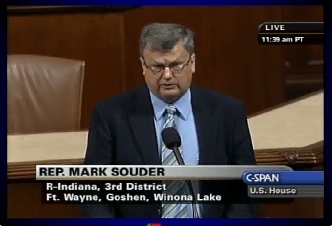
Mark Souder conceding the amendment
The bill will next go to a conference committee, whose job will be to produce a reconciled version of H.R. 3221 and a yet-to-be-passed Senate bill. The final version must then be reapproved by both the House and the Senate. If that final version contains the same or very similar language, it will mark the second significant reduction of the penalty, the decade-old handiwork of arch-drug warrior Rep. Mark Souder (R-IN). In 2006, the provision was scaled back to include only drug convictions that occurred while students were enrolled in college and receiving financial aid (a change supported by Souder himself).
The House victory came only after Souder attempted and finally gave up a last ditch effort to undo the reform. The Indiana conservative first submitted an amendment to strip out the new language in the Education & Labor committee where the bill originated earlier this year, a vote which he lost. This week, he submitted the amendment as the bill came up for a vote on the House floor, but then withdrew it after Rep. Ed Perlmutter (D-CO) suggested compromise language that would limit the provision's effect to felony drug convictions instead of drug sales convictions.
That compromise language came too late to be included in the House floor vote Thursday. It would presumably be offered up during conference committee.
But that wasn't the only reason Souder withdrew his amendment. As he conceded in a House speech Thursday, "I was probably going to lose today."
More than 200,000 students have already lost financial aid under the Souder aid elimination penalty because of drug convictions. Passage of SAFRA, with either the sales conviction language or the felony conviction language, would reduce the pool of students who would potentially be victimized by it. It's not full repeal, but it's another step closer.
back to top
Dear friend of drug law reform,
To kick off our autumn fundraising drive, we are pleased to offer an exciting new book written by three of our colleagues, "
Marijuana is Safer -- So Why Are We Driving People to Drink?," as our latest membership premium.
Donate $36 or more and we will send you a complimentary copy of "Marijuana is Safer" as our thanks.
"Marijuana is Safer" offers an engaging mix of history, science, medicine, media critique, and just plain straight talk about the history of alcohol and marijuana use in America, the differing attitudes toward the two drugs, the rise of marijuana prohibition, and the effects the two drugs have on users and society as a whole. "Marijuana is Safer" is a book you can hand to your mother or your teacher or your preacher, to help them see the inescapable conclusion that marijuana should be legalized.
Your support will come at an historic and critical moment. A moment when Congress is moving on a wide range of important reforms to drug policy. When the prohibition debate is reaching new heights. But when despite it all the new drug czar continues to talk nonsense like the old drug czar. I encourage you to join us today as we fight this important fight at this important time.
Our ability to bring drug war injustices to the attention of major media, to promote policy change in Congress, to reach millions of people online each year -- all of these are possible because of, and depend on, you.
We continue to offer our exciting new t-shirts that make the point about prohibition and the drug war. For a contribution of $36, you can choose either of our new StoptheDrugWar.org T-shirts pictured to the right — "Prohibition Doesn't Work" or "STOP" (click on images for an enlarged view). For a gift of $60 or more, you can receive both t-shirts. For a contribution of $90 or more, you can receive both shirts and "Marijuana is Safer" as our thanks, or substitute any item from the StoptheDrugWar.org inventory.
What you and I and our friends are doing together is working. We can't back off now. By taking advantage of the opportunity we have during this pro-reform climate, we can change minds, change laws and, most importantly, change good people's lives.
Thank you very much,

David Borden
Executive Director, StoptheDrugWar.org (DRCNet)
P.S. It's time to stop wasting time, money and good people's lives. Please join us in "Changing Minds, Laws & Lives" by adding
your support to StoptheDrugWar.org while we have this unique opportunity. Thank you!

back to top
by Bernd Debusmann, Jr.
Mexican drug trafficking organizations make billions each year trafficking illegal drugs into the United States, profiting enormously from the prohibitionist drug policies of the US government. Since Mexican president Felipe Calderon took office in December 2006 and called the armed forces into the fight against the so-called cartels, prohibition-related violence has killed over 12,000 people, with a death toll of over 5,000 so far in 2009. The increasing militarization of the drug war and the arrest of several high-profile drug traffickers have failed to stem the flow of drugs -- or the violence -- whatsoever. The Merida initiative, which provides $1.4 billion over three years for the US to assist the Mexican government with training, equipment and intelligence, has so far failed to make a difference. Here are a few of the latest developments in Mexico's drug war:
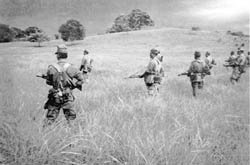
Mexican army anti-drug patrol
Last Thursday morning, the body count for the year passed 5,000. Four people were killed in Guerrero, among them a rural law enforcement officer. Additionally, in Chiapas, a group of gunmen threw a fragmentation grenade at a municipal office. Several people were wounded and a vehicle parked outside was damaged.
Friday, September 11
In Tijuana, authorities reported a spike in drug prohibition-related violence. Nineteen people were killed in the first eight days of September. Authorities have reported 405 homicides in Tijuana from January 1st through September 11th. This is less than half of the 843 homicides reported in 2008, but 68 more than the 2007 total. The Baja California attorney general's office believes that much of the recent violence is due to reprisals against suspected informers following the arrest of several high-level traffickers.
Saturday, September 12
In the resort city of Acapulco, five bullet riddled bodies were found dumped in a landfill. According to Mexican authorities, police found a note near the bodies which was signed "the boss of bosses." It is unclear to whom the note refers.
In Sinaloa,a municipal police commander was killed when his car was ambushed by four vehicles carrying an estimated twenty armed men. His 13-year old son and a friend of his were wounded. Two innocent bystanders, aged 14 and 17, were killed by stray bullets as they sat under a tree near the road. Meanwhile, four charred corpses were found in a burning car on the Mexico City-Oaxaca highway. In Ciudad Juarez, 12 drug-related murders were reported.
Sunday, September 13
In Ciudad Juarez, Eight people were killed in just a few hours. The eight people who were killed died in six different incidents. Among the dead was Jose Robles Ortiz, who was riddled with bullets on September 11th. His death is being investigated by the state prosecutor's office for the state of Chihuahua.
Monday, September 14
At the El Paso border checkpoint, over $1 million in cash was seized over the period of a few days. The largest seizure took place on Friday afternoon, when U.S. Customs and Border Protection officials found $802,720 in an SUV that was headed towards Mexico. Two Mexican nationals, aged 33 and 34, were detained and remain in El Paso County Jail. Two other seizures made during the week totaled $206,000. El Paso is just across the border from Ciudad Juarez, and is a lucrative drug trafficking corridor for Mexican drug trafficking organizations. It is a federal offense to not declare currency over $10,000 dollars upon leaving or entering the US.
Tuesday, September 15
In Tijuana and Ciudad Juarez, 21 people were killed on Tuesday. In Tijuana, firefighters found six bodies inside a burning car. Four of the men were seated in the car, while two were found in the trunk. In Ciudad Juarez, five people-including two brothers-were gunned down at a car wash. Ten people were killed in other acts of violence in the city. Five people were killed when gunmen opened fire at a hardware store, and five men in a pickup truck were killed when they were ambushed.
Wednesday, September 16
In Ciudad Juarez, suspected drug cartel gunmen attacked a drug rehabilitation clinic, killing ten. This is the second such attack this month. Drug gangs have targeted rehab clinics in Ciudad Juarez, claiming that they are protecting members of rival trafficking organizations. A spokesman for the states attorney's office said that the dead included nine men and one woman.
Mexican independence day celebrations took place under extremely heavy security, due to fears of violence. Security was especially tight in Morelia, Michoacán, where a grenade attack by members of La Familia cartel killed eight people and wounded over 100 during last year's celebrations. In many cities, traditional children's parades and outdoor parties were canceled because of security concerns.
Body count for the year: 5,136
Body count for the week: 181
Read last week's Mexico drug war update here.
back to top
More fun for the Philly narcs, a New Jersey ICE employee goes down, and a Brooklyn drug squad supervisor gets off easy. Let's get to it:
In Brooklyn, New York, the former supervisor of an NYPD narcotics team was sentenced last Friday to 160 hours community service for stealing $40 from a drug dealer and giving it to an informant who turned out to be an undercover cop. Michael Arenella was arrested in 2007 and charged with conspiring with corrupt cop Jerry Bowers, who agreed to testify against him. But Bowers flipped-out, allegedly killed his girlfriend, and wounded another woman. Bowers is doing time for the corruption case and faces trial for the attacks. Arenalla was acquitted by his trial judge of drug possession and sales charges, and has continued to deny significant involvement in a corruption scandal that put hundreds of cases against drug dealers at risk.
In Newark, New Jersey, a federal Immigration and Customs Enforcement (ICE) employee was arrested last Friday after allegedly trying to steal what he thought was a 110-pound shipment of cocaine. Valentino Johnson, 25, who worked for ICE's Detention and Removal Operations, was instead busted by federal agents and a New Jersey State Police SWAT team in a sting operation. He and two codefendants are charged with conspiring to possess and distribute cocaine. They face between 10 years and life in prison. Johnston and his pals went down after one of the pals bragged to an ICE informant that the trio had been robbing drug dealers. The informant set up a meet and told Johnson a cocaine shipment would be arriving. Johnson and pals went for the bait. Now, they're in jail.
In Philadelphia, another victim of a Philadelphia police drug squad run amok has filed a federal lawsuit against the city. Jose Duran, owner of Super One Market is suing over a September 2007 raid in which members of the Narcotics Field Unit entered the store, arrested Duran for selling small plastic baggies sometimes used by drug dealers, then proceeded to take what they wanted and trash the place. Part of the raid was captured on store video cameras -- before one of the officers was seen climbing toward a camera and grabbing the wires before the screen went black. The lawsuit contends police destroyed video equipment to "cover up illegal search and seizures" and that the narcs "intentionally and maliciously destroyed property, consumed food and beverages, stole money and merchandise, and deliberately caused food and other items to spoil by their illegal search practices." Duran said $15,000 worth of video equipment was destroyed and that the narcs stole or ruined another $10,000 in cash and merchandise. The Duran case is only one of many being investigated by a joint police Internal Affairs-FBI task force after one drug officer's former snitch publicly alleged that some officers made up information to get judge's to approve search warrants. Four veteran drug officers -- Jeffrey Cujdik and his brother Richard, Robert McDonnell, and Thomas Tolstoy -- have been put on desk duty pending the outcome of the inquiry. Both Cujdiks, Tolstoy, and three other police drug officers are named as defendants in the Duran suit. Jeffrey Cujdik, McDonnell, and two others are named in a separate lawsuit.
Read last issue's corrupt cops stories here.
back to top
In an annual report mandated by Congress under the Foreign Assistance Authorization Act, the State Department and President Obama Tuesday singled out three countries -- Bolivia, Burma, and Venezuela -- as failing to meet US anti-drug goals. The three nations had "failed demonstrably" to meet their anti-drug obligations, the report found.
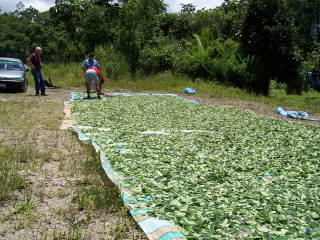
coca leaves drying by highway, Chapare region of Bolivia
All three countries have chilly relations with Washington. Burma's military junta is the object of international opprobrium, and Venezuela and Bolivia are allies in a leftist Latin American axis generally opposed to Washington's domination of the region.
Bolivia is the world's third largest coca and cocaine producer -- behind Colombia and Peru -- and has been criticized by the US for allowing coca production to increase, albeit slightly. Venezuela is not a drug producing nation, but is accused by the US of being a significant transit nation responsible for about one-quarter of cocaine exports from South America.
Both Bolivia and Venezuela say they are fighting against drug trafficking, and both can point to significant drug busts to back up that contention. In previous years, both countries have responded tartly to being placed on Washington's anti-drug black list, and this year, the reaction was similar.
In a Wednesday press conference in La Paz, Bolivian President Evo Morales told reporters the US "doesn't have the authority or moral standing to question" his countryâs battle against drug trafficking and challenged Washington to account for its own anti-drug efforts. Bolivia is fighting an "all-out battle" with the drug trade, Morales said, noting that Bolivian authorities had seized more than 19 tons of cocaine and coca paste so far this year, compared to 11 tons in 2005, the year he took office.
Morales made a point of noting that those seizures came without any help from the DEA, which he expelled from the country last year. He also pointedly asked why there is no certification of whether the US is reducing its drug demand. "As long as there is a market for cocaine, however much we reduce coca leaf, part will always be diverted (to cocaine production): that is our reality," the Bolivian president said.
Under the US law, failure to be certified as complying with US drug war objectives leads to a loss of foreign aid, but the measure also includes a provision for the president to waive the aid cut-off. President Obama chose to exercise that waiver power in the cases of Bolivia and Venezuela.
"In the cases of Bolivia and Venezuela," the State Department said, "the President has issued a national interest waiver so that the United States may continue to support specific programs to benefit the Bolivian and Venezuelan people. In Venezuela, funds will continue to support civil society programs and small community development programs. In Bolivia, the waiver will permit continued support for agricultural development, exchange programs, small enterprise development, and police training programs among others."
Presidents Evo Morales in Bolivia and Hugo Chavez in Venezuela have both expressed suspicion that the waivers are instead being issued to support groups and programs that might seek to subvert their governments.
The politicization of the US certification process can be seen in the fact that major drug producing or trafficking countries with significant government involvement in the trade, but who are US allies, such as Afghanistan and Pakistan, were not decertified.
The following countries made the list of major drug producing or transit countries: Afghanistan, the Bahamas, Bolivia, Brazil, Burma, Colombia, the Dominican Republic, Ecuador, Guatemala, Haiti, India, Jamaica, Laos, Mexico, Nigeria, Pakistan, Panama, Paraguay, Peru, and Venezuela.
back to top
Responding to years of agitation by harm reductionists and public health advocates, the Pennsylvania Board of Pharmacy Saturday published new regulations that will allow pharmacies to sell syringes without a prescription. The change goes into effect immediately. The move was lauded by activists as a significant public health victory in the battle against the spread of HIV/AIDS and Hepatitis C via injection drug use.
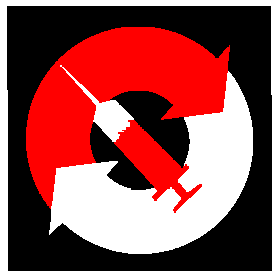
popular syringe exchange logo
Under previous regulations, pharmacies could sell syringes only to people who obtained a doctor's prescription. The new regulations carry no limit on the number of syringes that can be purchased at a time, nor do they have age limits.
"This change is particularly important in Pennsylvania because we have only two locations -- Pittsburgh and Philadelphia -- in which legally authorized syringe exchange programs operate," said David Webber, an attorney for the AIDS Law Project of Pennsylvania. "These two programs alone are simply not adequate to address this problem across the entire state, but syringe exchange programs continue to be crucial in providing sterile syringes as well as access to drug treatment and health care for injection drug users."
"This is a chance for every pharmacy to become part of HIV prevention in Pennsylvania," said Scott Burris, professor at Temple University's School of Law and a national authority on syringe regulation and HIV prevention. "The pharmacy board has taken an important step forward for evidence-based policy."
It didn't come swiftly or easily. Activist organizations including the Pennsylvania Aids Law Project, Prevention Point Pittsburgh, Prevention Point Philadelphia, as well as legislators, HIV workers, and others had lobbied for the change for a decade. An article in the Lancaster Intelligencer Journal cited several efforts:
- In 2002, a group called the Pennsylvania Coalition for Responsible Syringe Policy asked the Pharmacy Board to consider deregulation.
- In 2005, another group called Pennsylvanians for the Deregulation of Syringe Sales filed a formal petition to the Board, and met with legislators and officials in the Rendell Administration.
- In 2007, the the Pennsylvania Pharmacists Association endorsed syringe deregulation and asked the Pharmacy Board to move swiftly on it.
Robert Field, organizer of Pennsylvanians for the Deregulation of Syringe Sales and co-chair of the Lancaster-based Common Sense for Drug Policy, told the Intelligencer Journal he looked at syringe deregulation after efforts to start a syringe exchange program in Reading met with opposition. The board responded in August 2007, proposing new regulations allowing for over-the-counter syringe sales and opening them up for public comment. Thanks to concerns expressed by harm reduction and public health groups during the comment period, the board removed age and quantity restrictions.
The board heard a number of concerns from the Pennsylvania Medical Society that the rule change would increase drug use. But research won the day. "Studies indicate that making syringes available will reduce the spread of HIV and will not lead to an increase of illicit drug use," said Field.
The board also rejected record-keeping requirements requested by the House Professional Licensure Committee, saying it "does not believe that maintaining a record and requiring individuals to provide a name or other identifying information would advance the public health and safety."
Now the number of states that do not allow syringe sales without a prescription is down to two: Delaware and New Jersey.
back to top
Facing a $5 million budget deficit, the Minneapolis Police Department responded Monday by disbanding its narcotics squad. That makes Minneapolis the only major city in the US without one.

Minneapolis skyline
Last year, the 14-member narcotics squad investigated nearly 4,000 cases resulting in 519 federal and state charges. Officers seized about $300,000 in drug money, as well as 24 guns and 26 vehicles.
Police Chief Tim Dolan said the department still has sufficient resources to handle drug cases. He said community resource teams in the department's five precincts will handle street-level and mid-level dealing, while the Violent Offender Task Force will work on high-level cases. The department also has officers seconded to an anti-drug task force with state, local, and DEA members, and it has just started a gang unit, he said.
"Are we going to be as good as we were before in dealing with drug cases? I don't know," he said. "Their stats speak for themselves."
The former head narc, Lt. Marie Przynski, was not happy. "This unit has been highly productive, if not the most productive unit in the Minneapolis Police Department," Przynski said. "I'm disappointed, and so are my officers, about this decision."
The 14 former narcs will be reassigned, with three of them joining the Financial Crimes unit, including an asset forfeiture specialist and a specialist in pharmaceutical investigations ranging from forged prescriptions to insurance fraud. Other members of the defunct dope squad will be assigned at least temporarily to street patrols.
The department still needs to cut 50 positions to get under budget. It may also reduce the number of deputy chiefs from three to two. Still, Dolan said neither street patrols nor key units, such as homicide, robbery, sex crimes, juvenile, and domestic abuse would be reduced.
One city council member, Ralph Remington, suggested that the department could have more money if its members quit misbehaving. Just three weeks ago, the city paid out $495,000 to a man slugged by a Minneapolis police officer during a drug raid last year. That was only the most recent high-profile settlement paid by the city for departmental misbehavior.
"The department could save a lot of money if they corrected the bad behavior of a few bad cops," said Remington.
back to top
After four years of debate, Indonesia's parliament passed a new drug law Monday. It was immediately criticized by reformers on numerous counts.
The new law maintains the death penalty for some drug offenses, criminalizes drug addiction, and makes it a crime for parents to fail to report their addicted children to authorities. The law also transfers responsibility for fighting drug trafficking from the government to civil society.
"The drugs law will save our children and young generation. It will be essential in the fight against drug trafficking," said Minister for Law and Human Rights Andi Mattalatta after the bill was passed. "Currently, drug dealing is not only conducted by individuals but by drugs syndicates that operate neatly," he said.
But the Indonesian Coalition for Drug Policy Reform (ICDPR) begged to differ. "This law classifies drug addicts as criminals and therefore subjects them to criminal charges, while doctors have said that drug addiction is a curable disease," Asmin Francisca, the group's coordinator told reporters outside parliament's plenary session hall. "The law should have recognized that a proper solution to drug addiction is to empower drug addicts, not to punish them as criminals."
Asmin warned that the article in the law transferring responsibility for fighting trafficking from the government to civil society could lead to vigilante justice. "The article, however, does not clearly elaborate on what kind of civil participation is needed to fight the war against drug trafficking," she said. "Without clear regulations, the law is open to many forms of exploitation by civil groups, including acts of vigilantism."
Asmin also condemned the retention of the death penalty for some drug offenses.
"Death penalties are not in line with the purpose of modern criminal charges that aim to rehabilitate a person rather than punish them for their actions," she said. "Basically, I believe this law is not in line with the basic principles of human rights."
According to the Indonesian National Narcotics Agency's extremely precise figures, there are 27,000 drug users in the country, including 12,689 aged 30 or older, 6,790 between 25 and 29, 5,720 between 20 and 24, 1,747 between 16 and 19, and 109 users under the age of 16.
back to top
Six Dutch border town cannabis coffee shop owners seeking to block local authorities from shutting them down lost a court battle last Friday. A judge in Breda in the southern Netherlands ruled that the coffee shop owners had chosen the wrong judicial venue for their challenge of the ban.

downstairs of a coffee shop (courtesy Wikimedia)
On Wednesday, seven of the eight border town coffee shops closed their doors. An eighth stayed open, but the owner said he was only selling coffee.
The coffee shop owners are challenging a decision by the mayors of Roosendaal and Bergen-op-Zoom, both near the Belgian border, to close all eight coffee shops in their communities in a bid to stop "drug tourism." An estimated 25,000 foreigners pour into the two towns each week to take advantage of the Dutch policy that tolerates retail marijuana sales. They are blamed for causing problems ranging from public urination to traffic congestion to hard drug dealing.
Under the ban, the coffee shops could stay open and serve alcohol, but could not sell marijuana. If they continued to sell marijuana, they could be punished with a five-year closure.
The ban by the mayors comes as the Dutch government wrestles with how to reduce or eliminate the number of foreigners coming to Holland from more repressive neighboring countries to buy marijuana. Last week, a leaked letter from three Dutch ministers suggested the government would seek a "members only" policy for the coffee houses.
Under European Union law, countries cannot discriminate by nationality, so the Dutch cannot ban foreigners from becoming coffee house members. But the Dutch government wants to get around the law by requiring that marijuana be purchased only with credit cards issued by Dutch banks.
back to top
September 18, 1969: In testimony before the Senate Special Subcommittee on Alcohol and Narcotics, Judge Charles W. Halleck of the District of Columbia Court of General Sessions explains why he no longer issues jail sentences to youthful marijuana offenders: "If I send a [long-haired marijuana offender] to jail even for 30 days, Senator, he is going to be the victim of the most brutal type of homosexual, unnatural, perverted assaults and attacks that you can imagine, and anybody who tells you it doesn't happen in that jail day in and day out is simply not telling you the truth... How in God's name, Senator, can I send anybody to that jail knowing that? How can I send some poor young kid who gets caught by some zealous policeman who wants to make his record on a narcotics arrest? How can I send that kid to jail? I can't do it. So I put him on probation or I suspend the sentence and everybody says the judge doesn't care. The judge doesn't care about drugs, lets them all go. You simply can't treat these kinds of people like that." [Ed: This quote was given in 1969. By repeating it in full, Drug War Chronicle does not intend to imply that any kind of sexual assault is acceptable.]
September 21, 1969: In an attempt to reduce marijuana smuggling from Mexico, the Customs Department, under Commissioner Myles Ambrose, acting on the orders of President Richard Nixon, launches Operation Intercept, subjecting every vehicle crossing the Mexican border to a three-minute inspection and to many observers marking the beginning of the modern war on drugs. The operation lasts two weeks and wreaks economic havoc on both sides of the border, but fails to seriously impact the flow of marijuana into the US.
September 19, 1986: Federal Judge H. Lee Sarokin says, "Drug testing is a form of surveillance, albeit a technological one. Nonetheless, it reports on a person's off-duty activities just as surely as if someone had been present and watching. It is George Orwell's Big Brother society come to life."
September 24, 1997: A federal grand jury in San Diego indicts Mexican cartel leader Ramón Arellano Félix on charges of drug smuggling. The same day he is added to the FBI's 10 Most Wanted List.
September 20, 1999: The public is finally informed of the results of Washington, DC's Initiative 59, the Legalization of Marijuana for Medical Treatment Initiative of 1998, after Judge Richard Roberts orders the release of the tally previously suppressed by Congress. Voters had supported medical marijuana by 69-31%.
September 19, 2002: The Guardian (UK) reports that Mo Mowlam, the former cabinet minister responsible for drugs policy, is calling for the international legalization of the drug trade as part of a more effective drive to combat terrorism.
September 23, 2002: Mike and Valerie Corral's medical marijuana hospice near Santa Cruz, California, is raided just before dawn by federal agents. The Corrals are held at gunpoint while their co-op garden is destroyed.
September 21, 2004: In a speech, US House Speaker Dennis Hastert (R-IL) says, "The illegal drug trade is the financial engine that fuels many terrorist organizations around the world, including Osama bin Laden."
back to top
Do you read Drug War Chronicle? If so, we'd like to hear from you. DRCNet needs two things:
- We are in between newsletter grants, and that makes our need for donations more pressing. Drug War Chronicle is free to read but not to produce! Click here to make a donation by credit card or PayPal, or to print out a form to send in by mail.
- Please send quotes and reports on how you put our flow of information to work, for use in upcoming grant proposals and letters to funders or potential funders. Do you use DRCNet as a source for public speaking? For letters to the editor? Helping you talk to friends or associates about the issue? Research? For your own edification? Have you changed your mind about any aspects of drug policy since subscribing, or inspired you to get involved in the cause? Do you reprint or repost portions of our bulletins on other lists or in other newsletters? Do you have any criticisms or complaints, or suggestions? We want to hear those too. Please send your response -- one or two sentences would be fine; more is great, too -- email [email protected] or reply to a Chronicle email or use our online comment form. Please let us know if we may reprint your comments, and if so, if we may include your name or if you wish to remain anonymous. IMPORTANT: Even if you have given us this kind of feedback before, we could use your updated feedback now too -- we need to hear from you!
Again, please help us keep Drug War Chronicle alive at this important time! Click here to make a donation online, or send your check or money order to: DRCNet, P.O. Box 18402, Washington, DC 20036. Make your check payable to DRCNet Foundation to make a tax-deductible donation for Drug War Chronicle -- remember if you select one of our member premium gifts that will reduce the portion of your donation that is tax-deductible -- or make a non-deductible donation for our lobbying work -- online or check payable to Drug Reform Coordination Network, same address. We can also accept contributions of stock -- email [email protected] for the necessary info.
back to top
StoptheDrugWar.org (DRCNet) is pleased to be a partner in the upcoming 2009 International Drug Policy Reform Conference, this November 12-14 at the Hyatt Regency in Albuquerque, New Mexico.
The Reform Conference, sponsored by our friends at the Drug Policy Alliance, is the major biennial gathering of drug policy reformers of all kinds. The last one, held in New Orleans in 2007, brought together over 1,000 attendees representing 25 different countries. This year attendees will have the opportunity to spend three days interacting with people committed to finding alternatives to the war on drugs while participating in sessions given by leading experts from around the world. Click here to register -- early bird rates are available through October 9, and discounts are available for students and New Mexico residents.
Some testimonials from the 2007 conference:
"The conference was a tremendous educational experience. I established tons of contacts and look forward to a future dedicated to fighting the drug war."
"Lots of great energy! This was my very first conference and I would most definitely recommend it to any health care professional desiring information on this subject. The speakers were very educated on their subjects and readily available to answer questions."
"This conference has been an incredible experience. The level of knowledge and experience from the presenters has been fantastic."
"I thought the conference was a wonderful collaboration of minds and knowledge on the multiple aspects of drug policy. I enjoyed having applicable speakers on both sides of the debate of policy and drug reform."
"This conference exceeded my expectations in every way possible. As a first year attendee I had no idea what I would learn."
"Once again, thank you for the most exciting and informative conference in the world."
Hope to see you there.
back to top
Along with our weekly in-depth Chronicle reporting, DRCNet also provides daily content in the way of blogging in the Stop the Drug War Speakeasy -- huge numbers of people have been reading it recently -- as well as Latest News links (upper right-hand corner of most web pages), event listings (lower right-hand corner) and other info. Check out DRCNet every day to stay on top of the drug reform game! Check out the Speakeasy main page at http://stopthedrugwar.org/speakeasy.

prohibition-era beer raid, Washington, DC (Library of Congress)
Since last issue:
Scott Morgan writes: "Former Mexican President Proposes Legalizing Drugs in Mexico AND the US," "The Marijuana Ads That ABC, FOX, and CBS Refused to Show You," "The Weekly Standard Cheers on Mexican Drug War Bloodshed," "No Matter How Bad You Think the Drug War Is, It's Worse," "Using Drug Laws to Steal From Innocent People," "US Forest Service Apologizes for Racist Marijuana Warning" and "Drug War Violence is Destroying Mexico's Economy."
Phil Smith previews several Drug War Chronicle articles, and reports: "The Manhattan DA's Race: The Princess of Darkness vs. Two Former Coke-Snorting Assistant DAs."
David Borden offers: "A Victory in the House of Representatives," "ALERT: Crucial Vote on Souder's Law Happening Tomorrow -- YOUR PHONE CALLS NEEDED!," "Drugs the Most Numerous Arrest Type in '08, Though Down Slightly from '07, FBI Reports" and "Room for Debate on Mexico's Drug Decriminalization Law."
David Guard posts numerous press releases, action alerts and other organizational announcements in the In the Trenches blog.
Again, http://stopthedrugwar.org/speakeasy is the online place to stay in the loop for the fight to stop the war on drugs. Thanks for reading, and please join us on the comment boards.
back to top
Want to help end the "war on drugs," while earning college credit too? Apply for a StoptheDrugWar.org (DRCNet) internship for this summer or fall semester and you could come join the team and help us fight the fight!
StoptheDrugWar has a strong record of providing substantive work experience to our interns -- you won't spend the summer doing filing or running errands, you will play an integral role in one or more of our exciting programs. Options for work you can do with us include coalition outreach as part of the campaign to rein in the use of SWAT teams, to expand our work to repeal the drug provision of the Higher Education Act to encompass other bad drug laws like the similar provisions in welfare and public housing law; blogosphere/web outreach; media research and outreach; web site work (research, writing, technical); possibly other areas. If you are chosen for an internship, we will strive to match your interests and abilities to whichever area is the best fit for you.
While our internships are unpaid, we will reimburse you for metro fare, and DRCNet is a fun and rewarding place to work. To apply, please send your resume to David Guard at [email protected], and feel free to contact us at (202) 293-8340. We hope to hear from you! Check out our web site at http://stopthedrugwar.org to learn more about our organization.
back to top





